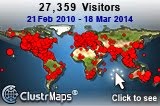"Don't be tempted by the shiny apple, don't you eat of a better fruit. Hunger only for a taste of justice; hunger only for a world of truth. Cause all that you have is your soul.
As I reflect on TEDxDenverEd, what keeps coming to the forefront of my mind is this:
The most important thing you bring to teaching is your soul.
Your soul is your passion, your love for the world, your caring for students and for learning, your desire to share with others. Your passion may not be all that you have, but it's the fuel. Without passion you are an empty shell.
Many things touched me at TED last night. Even though I'm "edtechworkshop," I resonated most with the non-techie speakers- inspiring educators like Brian Crosby, Sarah Elizabeth Ippel, Earthsea, and Dafna Michaelson. I was heartened by the environmental message that, thank goodness, was showcased on the TED stage with equal or greater importance than futuristic tech (5000 days to get it together, people!!!!!)
The two women who spoke as Earthsea, Pandora and Zakiya really struck a chord with me as they talked about weaving your passions into your work, walking your unique path because only you can do what YOU are supposed to be doing in this life. Was it a sign that they are from the Bay Area and showed a video from Hunter's Point, where my own path as an educator began?
Another of the speakers....and I apologize for not remembering who said exactly what. (I'm finishing this post several days later, talks are not yet posted online and I didn't take any notes during the show)....anyway, another of the speakers referred to "islands" of good teaching but asked the poignant question, "Is the ocean supporting the island?"
Sadly, in my experience, the island often has to fight for it's right not to become the ocean.
Why is it so hard to speak the truth, walk the path, be who we truly are? This is a personal struggle for me, and I feel that I do a somewhat decent job of staying one step ahead of the ocean. But I have had at least 10 jobs in 18 years, and I often feel worried. I am different- too opinionated, too passionate. I see things differently than most of those around me, and it is for this reason that I identify with the island/ocean analogy.
Finally, Sarah Elizabeth Ippel...wow. She is more than a decade younger than I, but I would like to be like her when I grow up. (that's a little nod to Adora Svitak -- watch her TED talk, she's

awesome!) I am in awe of Sarah Elizabeth Ippel's fierce determination. This is a woman who trusted her instincts and followed her heart, despite being laughed at and negated over and over again. She submitted her proposal to start the Academy for Global Citizenship 3 times before it was finally approved by the board, and I loved what she said after she submitted in year 3 and was waiting for the response. "I was waiting and thinking, 'Am I going to have to
wait another whole year before I can try again?'" She had no intention of failing, no intention of quitting. She believed in herself, even when the establishment, "the ocean" repeatedly told her no. How many of us have this kind of confidence?
I recently filled out a feedback form about TEDxDenverEd. I summed up my feelings about the night by contrasting how I felt after TEDx with how I feel when watching mainstream media. I find myself feeling hopeless in the face of television news that showcases problems, but rarely solutions or reality shows that glorify excessive over-consumption and mediocrity. After TEDx, I felt hopeful again, inspired. I hope to be able to tap into those feelings in order to keep focused on my own path, to fortify me as I push back that ocean.











